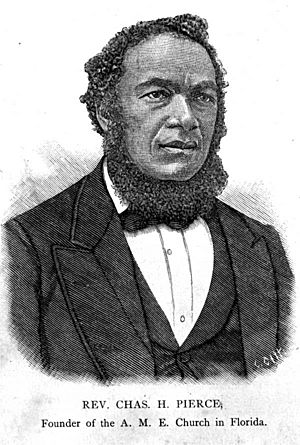Charles H. Pearce facts for kids
Quick facts for kids
Charles H. Pearce
|
|
|---|---|
 |
|
| Florida Senate | |
| In office 1870–1884 |
|
| Personal details | |
| Born | 1817 Maryland |
| Died | 1887 (aged 69–70) |
| Political party | Republican |
Charles H. Pearce (1817–1887) was an important leader in Florida. He was a minister and a politician. He helped many people after the American Civil War.
Pearce was a minister in the African Methodist Episcopal (AME) Church. This was the first independent church for Black Americans. He came to Florida in 1865. He helped build AME churches across the state. He also worked to help people during the Reconstruction era. This was a time when the country was rebuilding after the war.
In 1868, Pearce became a delegate to the Florida Constitutional Convention. Later that year, he was elected to the Florida Senate. He served many terms, working for civil rights and public education for everyone.
Contents
Charles H. Pearce: Early Life and Freedom
Charles H. Pearce was born in 1817. He was born into slavery in Queen Anne's County, Maryland. When he was young, he saved money from his work. He used this money to buy his freedom.
After gaining freedom, he moved North. He went to New Haven, Connecticut. There, he studied and became a minister. He joined the African Methodist Episcopal (AME) Church. This church was started in 1816 by free Black people. It was the first independent Black church in the United States.
Later, Pearce moved to Canada. He became a British citizen there. Many African Americans had moved to Canada to escape slavery. He preached in Canada until 1865.
A Minister's Journey to Florida
In 1865, after the Civil War ended, Pearce moved to Florida. He came as an AME missionary. The church sent many missionaries to the South. Their goal was to help the freedmen. These were formerly enslaved people. They also wanted to start new churches.
Pearce settled in Tallahassee, Florida's capital city. This city is in Leon County, Florida. He worked hard to establish new AME churches.
A Leader in Florida Politics
Charles H. Pearce believed in helping his community. He once said that a minister must also look out for his people's political interests. He became a strong Black leader during Reconstruction. This was a challenging time. Many white groups, like the KKK, tried to stop Black people from voting. They also tried to harm Republican leaders.
Pearce joined the Republican Party. Most freedmen also joined this party. He used his church connections to build political power. In 1868, he was elected to the Florida Constitutional Convention. He was briefly removed because he was a British citizen.
But later in 1868, Pearce was elected to the Florida Senate. He served until 1870. He was re-elected in 1870 and again in 1872. He served in the Senate until 1884. During this time, he was a very important political figure in Leon County, Florida. Most of the people in Leon County were freedmen. Pearce had a lot of influence in supporting or opposing people running for office.
Fighting for Education and Rights
Pearce worked to create new schools. He helped start a school that later became Edward Waters College. This college is in Jacksonville, Florida. It is connected to the AME Church. He also helped get state support for education. He wanted all Floridians to have access to good schools.
Pearce faced challenges in his political career. In 1876, he was challenged as an elector for the Republican presidential candidate. This was due to a past legal issue from 1870. However, he had been pardoned in 1872. Despite the pardon, his opponents argued he could not serve. This showed how difficult it was for Black politicians during Reconstruction. White conservative Democrats often tried to stop Black people from voting or holding office. There was a lot of violence and intimidation during elections.
Pearce was a key figure in Florida's history. He fought for freedom, education, and civil rights. He helped shape the state during a very important time.
See also
 | Georgia Louise Harris Brown |
 | Julian Abele |
 | Norma Merrick Sklarek |
 | William Sidney Pittman |

